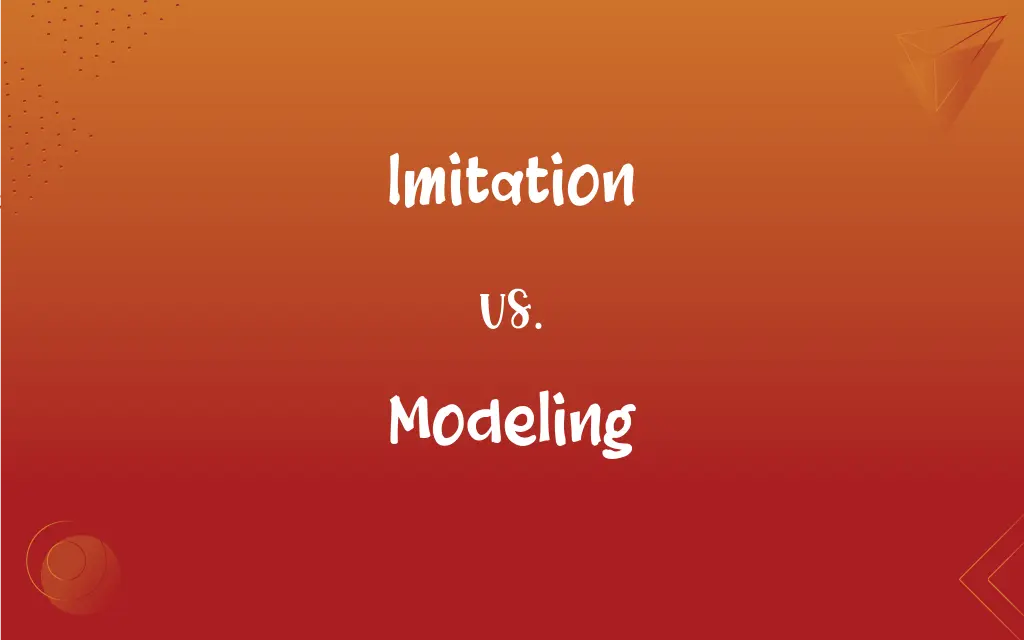Imitation vs. Modeling: What's the Difference?
Edited by Harlon Moss || By Janet White || Published on December 7, 2023
Imitation is copying someone's actions or creations, whereas modeling involves using abstract representations to understand or simulate real-world processes.

Key Differences
Imitation involves replicating behaviors, techniques, or artifacts created by others, often to learn or practice a skill. Modeling, on the other hand, is a process of creating a representation or simulation to analyze, predict, or understand complex systems or phenomena.
Imitation is common in learning environments where the imitation of a mentor's actions facilitates skill acquisition. In contrast, modeling is used in scientific and mathematical contexts to construct theoretical models that represent real-world situations.
Imitation is direct and often visible, as seen in art or performance, while modeling is more abstract, involving mathematical formulas, computer simulations, or conceptual frameworks.
In imitation, the goal is often to replicate the original as closely as possible, as in mimicry or duplication. Modeling, however, aims to capture essential features of a complex system, simplifying reality to understand underlying principles.
Imitation can be seen as a form of homage or practice, such as a student artist imitating a master’s style. Modeling, in disciplines like economics or engineering, involves constructing models to test hypotheses or design solutions.
ADVERTISEMENT
Comparison Chart
Purpose
To replicate or mimic behaviors or creations
To create abstract representations for analysis or simulation
Usage Context
Learning, arts, performance
Science, mathematics, engineering
Nature
Concrete, visible, and direct
Abstract, theoretical, often using simulations
Goal
Close replication of the original
Understanding or predicting complex systems
Examples
Copying a painting technique
Developing a climate change simulation model
ADVERTISEMENT
Imitation and Modeling Definitions
Imitation
Emulation of a model or example.
He perfected his craft through imitation of great artists.
Modeling
Designing a prototype or example to test theories or designs.
Her modeling of the new software interface was innovative and user-friendly.
Imitation
Reproduction of someone else's behavior or creation.
Her imitation of the famous singer's voice was impressive.
Modeling
The process of creating a representation or simulation of reality.
In modeling the solar system, she used software to simulate planetary orbits.
Imitation
A copy or duplication that resembles an original.
The imitation jewelry looked almost like real gold.
Modeling
Creating a simplified version of a system for analysis or prediction.
The architect's modeling of the new building was detailed and precise.
Imitation
Act of mimicking or replicating an existing work or action.
The child's imitation of his father's walk made everyone laugh.
Modeling
Constructing a theoretical framework to understand complex systems.
His modeling of the economic market helped explain recent trends.
Imitation
A facsimile or likeness of an original item.
The museum displayed an imitation of the ancient statue.
Modeling
Using abstract concepts to represent real-world phenomena.
Modeling climate change requires complex algorithms and data analysis.
Imitation
The act or an instance of imitating
Gave us his imitation of a famous actor.
Modeling
The act of being a model
When parents eat healthy food themselves, this modeling influences their children's dietary habits.
Imitation
Something derived or copied from an original, often in an inferior way
An undrinkable imitation of real lemonade.
Modeling
The act or art of sculpting or forming in a pliable material, such as clay or wax.
FAQs
How is modeling used in science?
In science, modeling is used to create simulations or theoretical frameworks to understand complex systems.
What role does modeling play in economics?
In economics, modeling is crucial for predicting market trends and analyzing economic phenomena.
Do models always accurately represent reality?
Models aim to represent reality but often simplify complex systems for better understanding.
Can imitation be a form of flattery?
Yes, imitation is often considered a form of flattery or homage.
What is an example of modeling in technology?
An example of modeling in technology is creating computer simulations to test software designs.
How important is accuracy in modeling?
Accuracy is crucial in modeling to ensure reliable predictions and understanding.
Does imitation require creativity?
Imitation may not require as much creativity as original work, but it often requires skill and understanding.
What is the primary purpose of imitation?
The primary purpose of imitation is to replicate or mimic someone else's behavior or creation.
Is imitation important for learning?
Yes, imitation is a key aspect of learning, especially in skill acquisition and arts.
What skills are needed for effective modeling?
Effective modeling requires analytical skills, abstract thinking, and often mathematical knowledge.
Can imitation lead to loss of originality?
Excessive imitation can lead to a loss of originality and hinder creative development.
Can imitation be seen in animal behavior?
Yes, imitation is common in animals, especially as a learning process in young animals.
How does imitation differ from inspiration?
Imitation involves directly copying, while inspiration involves taking ideas and creating something new.
Can imitation lead to innovation?
Imitation can lead to innovation by inspiring improvements or variations on the original.
Is it ethical to sell imitations?
Selling imitations can be unethical and illegal if it violates intellectual property rights.
What is the future of modeling in AI?
The future of modeling in AI includes more advanced simulations, machine learning models, and predictive analytics.
Is modeling used in environmental studies?
Yes, modeling is widely used in environmental studies to predict climate change impacts and ecosystem dynamics.
Are imitations always legal?
Imitations can infringe on copyrights or patents, so they are not always legal.
Can modeling help in disaster management?
Yes, modeling can be critical in disaster management for predicting and planning for natural disasters.
How has modeling impacted medicine?
Modeling has significantly impacted medicine, particularly in drug development and understanding disease spread.
About Author
Written by
Janet WhiteJanet White has been an esteemed writer and blogger for Difference Wiki. Holding a Master's degree in Science and Medical Journalism from the prestigious Boston University, she has consistently demonstrated her expertise and passion for her field. When she's not immersed in her work, Janet relishes her time exercising, delving into a good book, and cherishing moments with friends and family.
Edited by
Harlon MossHarlon is a seasoned quality moderator and accomplished content writer for Difference Wiki. An alumnus of the prestigious University of California, he earned his degree in Computer Science. Leveraging his academic background, Harlon brings a meticulous and informed perspective to his work, ensuring content accuracy and excellence.






































































